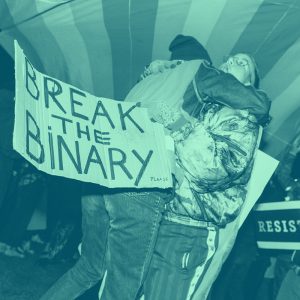Gender & Sexuality dictionary
International Non-Binary People’s Day
Or International Nonbinary People’s Day [ in-ter-nash-uh-nl non-bahy-nuh-ree pee-puhlz dey ]
What is International Non-Binary People’s Day?
International Non-Binary People’s Day is a day dedicated to celebrating and supporting nonbinary people.
People who identify as nonbinary are those whose gender identity does not conform to the male/female gender binary.
Observance of the day often involves raising awareness about issues that affect nonbinary people, including the discrimination that they frequently face.
The day is observed in a variety of ways, including with educational events and efforts to make spaces, such as schools and workplaces, more inclusive for nonbinary people.
Some people use International Non-Binary People’s Day as an occasion to publicly identify as nonbinary for the first time.
International Non-Binary People’s Day is part of Non-Binary Awareness Week, a weeklong observance devoted to nonbinary people and to raising awareness of the issues that affect them.
⚡️When is International Non-Binary People's Day?
International Non-Binary People’s Day is observed each year on July 14. The date was chosen because it falls exactly halfway between International Women’s Day (March 8) and International Men’s Day (November 19).
Where does International Non-Binary People’s Day come from?

International Non-Binary People’s Day was first observed in 2012. The word nonbinary is often used as an umbrella term that covers a lot of people—including anyone who doesn’t consider themself entirely male or female. Some nonbinary people may identify as having no gender (agender), as having a gender somewhere between male and female, as sometimes a man and sometimes a woman or a combination (gender-fluid or bigender), or in a way that’s totally outside these constructs. Some may identify using other terms, such as gender-nonconforming or genderqueer.
Some nonbinary people identify as transgender, and some don’t. Some intersex people identify as nonbinary, while others don’t. Some cultures have notions of gender that are not rooted in the gender binary. Some Indigenous people in the Americas who identify as Two-Spirit may consider themselves to be nonbinary, while others may not.
Examples of International Non-Binary People’s Day
Who uses International Non-Binary People’s Day?
Did you know … ?
- Some nonbinary people call themselves enbies, taken from the abbreviation nb (for nonbinary).
- While many nonbinary people use the pronouns they/them rather than he/him or she/her, not all of them do. Some nonbinary people use he or she, some use both, and some people use different pronouns, such as xe/xem.
- The nonbinary flag consists of yellow, white, purple, and black horizontal stripes.
What are other words used in discussion of International Non-binary People’s Day?
Note
This is not meant to be a formal definition of International Non-Binary People’s Day like most terms we define on Dictionary.com, but is rather an informal word summary that hopefully touches upon the key aspects of the meaning and usage of International Non-Binary People’s Day that will help our users expand their word mastery.